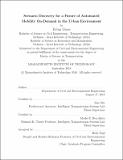Scenario discovery for a future of automated mobility on-demand in the urban environment
Author(s)
Gross, Eytan
DownloadFull printable version (2.215Mb)
Other Contributors
Massachusetts Institute of Technology. Department of Civil and Environmental Engineering.
Advisor
Jimi Oke and Moshe E. Ben-Akiva.
Terms of use
Metadata
Show full item recordAbstract
Future uncertainty has always been a hindrance in the field of transportation planning. It is difficult to make robust decisions regarding optimal transportation policies when uncertainty is so wide. This project presents a novel approach for applying scenario discovery to agentbased simulation. In scenario discovery we define a space of uncertainty, and seek to find sub-spaces where strategies fail. Since scenario discovery requires running multiple simulations under different conditions of uncertainty, we can produce compelling narrative as to why certain strategies fail in the space where they do. Our two main performance measures are individual accessibility and overall petroleum-based energy consumption. We apply the Patient Rule Induction Method (PRIM), a method for clustering points within a hyper-space that fail to meet certain criteria, to both of these outputs. The strategies that were tested were: the current state; a strategy where automated mobility on-demand replaces current forms of mobility on-demand; a strategy where the frequency of all public transportation lines is doubled; a strategy where automated mobility on-demand are used only to solve the first-last mile problem for public transportation; and a strategy where all private modes are banned from entering the city's central business district (CBD). The strategy which produced the best overall performance taking into account both accessibility and energy consumption was the strategy by which the CBD was restricted. This framework of scenario discovery applied to agent-based simulation can be applied to additional modeled cities in the future.
Description
Thesis: S.M. in Transportation, Massachusetts Institute of Technology, Department of Civil and Environmental Engineering, 2018. This electronic version was submitted by the student author. The certified thesis is available in the Institute Archives and Special Collections. Cataloged from student-submitted PDF version of thesis. Includes bibliographical references (pages 113-116).
Date issued
2018Department
Massachusetts Institute of Technology. Department of Civil and Environmental EngineeringPublisher
Massachusetts Institute of Technology
Keywords
Civil and Environmental Engineering.